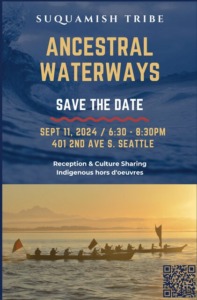Elders Calendar – June 2024
List of Elders Events, June 2024, Subject to Change
Tuesdays & Thursdays: Elders Fitness, 10:30-11:30 AM, Fitness Center on Totten Road—Thursdays are also Elders Chair Volleyball
Mon, Jun 3 “Until Help Arrives” Emergency Prep Workshop, 9 AM-Noon, House of Awakened Culture, Key actions to take before help arrives
Tue, Jun 4 Muckleshoot Elders Honoring, Shuttle leaves Casino front entrance at 7 AM, Doors open 8:30 AM, Muckleshoot Events Center, Auburn
Fri, Jun 7 Foot Care Friday, By appointment only —Call Della at 360-294-8417 or Melissa at 360-394-8472
Tue, Jun 11 Movie Night, Regal Poulsbo, meet Della at theater from 5:30 to 6 PM for tickets
Fri, Jun 14 Chair Volleyball Tournament, Suquamish Elders vs. Tribal Council, 11 AM, Fitness Center on Totten Road, come cheer for Elders!
Sat, Jun 15 Muckleshoot Indian Relay Races, Shuttle leaves casino at 11 AM, 1:30 PM Start, Emerald Downs, 2300 Ron Crockett Drive, Auburn
Tue, Jun 18 Sugar Savvy Elders, Noon-1 PM, Elders Dining Room, with Tribal Nutritionist Rachel Parsons
Tue, Jun 18 Elders Council Meeting, 2-4 PM Elders Lodge, Zoom link here.
Wed, Jun 19 Juneteenth, Tribal Offices Closed
Wed, Jun 26 Necklace Beading, 1-4 PM, Elders Lodge, Making giveaway necklaces for Tribal events.
Fri, Jun 28 Tribal Distribution Checks, Direct-deposit, or sent by mail
TCW hosting Family Carnival May 10
Part of National Foster Care Month to honor & encourage unsung heroes
Suquamish Tribal Child Welfare is excited to invite everyone in the tribal community — including tribal members, their families, tribal government staff, as well as all friends & allies of the Suquamish Tribe — to join us in celebrating the youth and children and those who contribute significantly to their lives.
TCW will be hosting a Family Carnival on May 10 from 4-7pm at the Family & Friends Center on Totten Road. There will be a variety of classic carnival games, activities, prizes, dinner, and dessert. Information will also be available for those who might be interested in becoming a placement home, foster home, or any other type of support for our children or youth.
The Carnival is part of TCW’s effort to help raise awareness for National Foster Care Month, when the tribal community comes together to honor and appreciate the unsung heroes who play a vital role in the lives of children and youth in foster care. These remarkable individuals include:
- Community Placement and Foster Parents – These compassionate souls open their hearts and homes to children who have faced adversity. They provide stability, love, and guidance during challenging times. They are safe havens, who offer temporary refuge to children while they await reunification with their biological families or the establishment of guardianship with relatives or kinship caregivers.
- Family Members – Relatives who step up to care for their relations during difficult circumstances, ensuring that children remain connected to their roots.
- Volunteers – Selfless community members who dedicate their time and energy to support foster youth, whether through mentoring, tutoring, or simply being a listening ear.
- Mentors – These role models inspire and empower foster youth, helping them navigate life’s complexities and build a brighter future.
- Child Welfare Professionals – Social workers, counselors, and advocates who tirelessly work to ensure the well-being of children in foster care.
- Other Community Members: Neighbors, teachers, coaches – and all the friends who extend kindness, understanding, and encouragement to these resilient young souls.
Children in foster care have faced the heart-wrenching reality of leaving their homes due to circumstances beyond their control—unstable or unsafe situations that necessitate their removal. In their vulnerability, they turn to the loving adults in our communities for the support their own families may be unable to provide at that moment.
“Let us recognize and celebrate these everyday heroes who make a difference in the lives of foster youth,” says Heather Zaiss, the director of Tribal Child Welfare. “Together, we can create a more compassionate and nurturing world for these remarkable children, ensuring they find the love, stability, and hope they deserve.
Throughout May, the TCW team will dedicate focused efforts to recruit foster and placement homes, volunteers, and short-term respite providers.
“We welcome anyone with an interest in being part of the lives of the children we support and serve, to please come by or give us a call,” says Zaiss. “As members of the TCW team, we also take this time to reaffirm our commitment to securing a promising future for the children and youth under the umbrella of the Tribal Child Welfare system.
“TCW is excited to invite you all and your families to join us in celebrating the youth and children and those who contribute significantly to their lives.”
Suquamish Tribe Graduate Honoring set for June 25
Please join us for an evening of celebration on June 25 as we honor our 2023-24 graduates!
Hosted by the Suquamish Tribe Education Department, the evening starts at 5pm at the House of Awakened Culture.
This event is open to Suquamish Tribal Members, Descendants, and their families.
To be placed on the graduate honoring list, 2023-24 grads will need to:
- Fill out this short questionnaire by June 1.
- Submit required documents by June 17.
- High School grads please contact Trish Chargualaf at (360) 394-8645 or tchargualaf@suquamish.nsn.us.
- Higher Education grads please contact Kali Chargualaf at (360) 394-1328 or kchargualaf@suquamish.nsn.us.
We look forward to seeing everyone there!







